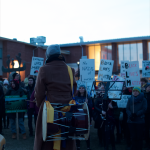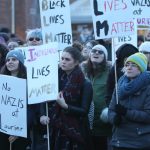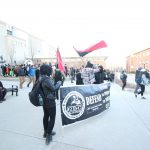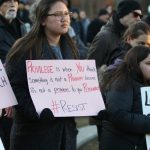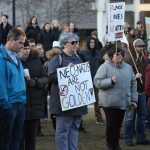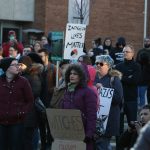Unpopular Opinions speaker series disrupted by fire alarm, sparks counter-demonstration
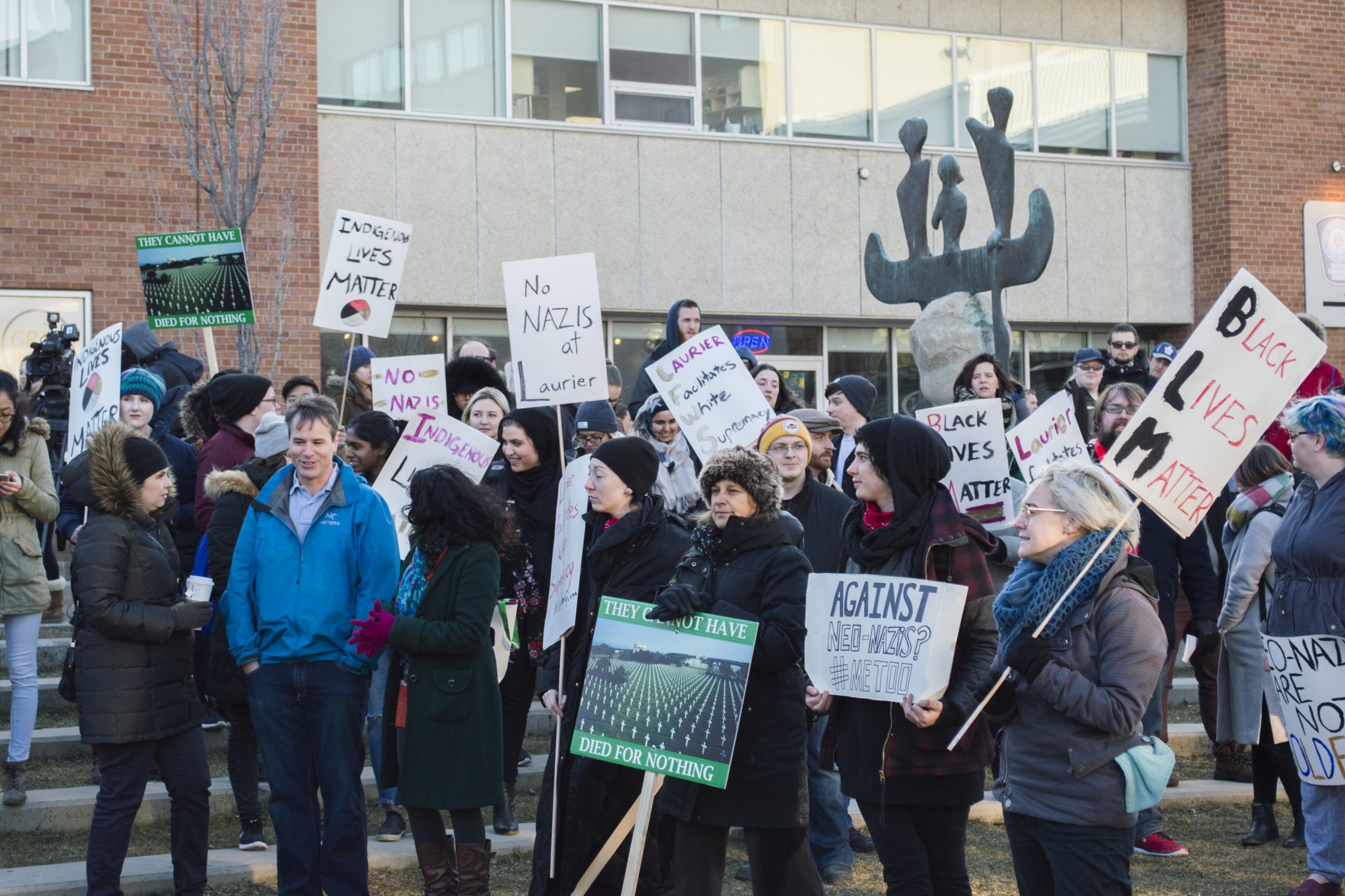
Wilfrid Laurier University’s Waterloo campus is currently embroiled in another polarizing debate, although this time around it is much less vague with respect to where people stand.
The debate is, again, centred around Lindsay Shepherd and her efforts to promote “open inquiry” on campus at Laurier. She aims to do this by hosting a series of speakers under the premise of “The Unpopular Opinion Speaker Series.”
The first speaker in the series was set to be Faith Goldy.
Goldy – who, back in December, famously cited the 14-word neo-Nazi oath in a podcast – is known for her ties to right-wing and far-right media publications including The Daily Stormer and The Rebel Media.
Leading up to the event, hundreds of counter-protestors set up in the quad, performing songs and giving speeches as Shepherd prepared to host Goldy.
“We’re just a group of concerned students who got together and thought that we can’t just let one side of the message stand,” Ann Marie, a Laurier student said. Ann Marie acted as the media liaison for the counter protest.
“We wanted people to know that it’s not as black and white as it seems and there’s another part to this … there’s another part of the so-called freedom of expression or freedom of speech discourse that actually silences students on this campus.”
Ann Marie said that the event was organized by a collective of various students.
“Honestly, its just a whole bunch of students from all kinds of different places. We’re not representing one particular group … we’re just students who have had enough of this and wanted to do something proactive and we don’t have a name,” she said.
“Mark my words, I will come back and I will give that presentation.”
“We wanted to celebrate our own voices that would be silenced in that event and we just wanted to show solidarity with one another and to lift each other.”
Ruth Cameron, a second-year PhD candidate, was among the performers who demonstrated at the counter-protest.
“I would say that this event is important to me,” she said.
“Students who are marginalized in this institution are put in a really difficult place by the actions taken by the university, to be asked to remain silent in the face of hate speech.”
Cameron spoke to the nature of the LSOI’s event which was set to take place on campus at the same time as the protest.
“We are not interested in giving a platform to individuals such as the the two women who are engaged in this action over on the other side of campus,” she said.
“We’re also not interested in acting like nothing is wrong and burying our heads in the sand.”
Back at the Paul Martin Centre the tension began to mount, and as hundreds of people lined up from the entrance to the concourse, it became clear that the event would hit capacity very quickly.
Because of this, those in attendance were asked to sign up as members of LSOI in order to guarantee admittance. As the room began to fill up, members of the media pooled up in the side aisles and attendants were asked to back up against the wall if they weren’t seated due to fire safety regulations.
Laurier professor William McNally stood at the front of the room and began his introduction.
“I want to thank our guest speaker, Faith Goldy, and the Laurier Society for Free Inquiry, the university – I want to thank them because they are taking this very seriously…” McNally began.
Just as McNally began to set out “a few ground rules,” the fire alarm was pulled.
Laurier confirmed to The Cord that a precondition of the event meant that a fire alarm would result in evacuation and, for safety reasons, the event would not resume as planned in the designated room. The response in the crowd was mixed, some seemed excited at eliciting response, and others disappointed that the event would not longer commence.
“This is a really juvenile, irresponsible [response],” McNally said.
“Well folks, we’re going to get some fresh air,” he said, as members of LSOI decided to move their talk to Veteran’s Green, an outdoor space directly across the street from Laurier’s campus.
After the room was evacuated, Lindsay Shepherd addressed a mixed crowd of supporters and protestors from the very same spot she spoke at five months ago at a free speech rally – which was also attended by Faith Goldy.
She expressed disappointment to the crowd, but stated that the next time Faith Goldy is invited to speak on campus – in a month or so, she presumes – they will choose a venue with a larger capacity.
“While premised on the notion of free inquiry, there is little doubt that these speakers are increasingly brought to campus in a specific attempt to provoke resistance.”
“The turnout was amazing but this was super disappointing – so much work goes into this. We were respectful about their counter-demonstration, we attended and we listened for the time that we could before we had to leave. We didn’t disrupt, but it’s just their tactics that they disrupt,” Shepherd told The Cord.
“They could have just asked challenging questions at the end, but it’s too bad that that’s how they are going to play it.”
After Shepherd spoke, Goldy allegedly made a joke about land acknowledgements before offering a brief statement.
“Mark my words, I will come back and I will give that presentation,” she said.
The scheduled talk had been met with resistance from throughout the Laurier community and the Kitchener-Waterloo community as well; the official response from the school vaguely supported LSOI’s right to host the event.
Deborah MacLatchy, president and vice-chancellor of Laurier, released a statement addressing the Laurier community on the morning of March 20. In her statement, she spoke to the decision to invite Goldy to campus and the ensuing backlash.
“I want to state very clearly that I personally and absolutely reject the ideas and values attributed to this speaker and that they are in no way aligned with or reflective of the core values of our university,” the letter read.
“It is my sincere hope that the organizers of, and participants in, this event take seriously the responsibilities and accountabilities that accompany free expression and will engage in a civil discourse that is free from hate.”
MacLatchy’s statement also refers back to a notice that was posted by Laurier on Friday. The notice began by stating that: “Some have asked why the university permits controversial speakers on its campuses. Wilfrid Laurier University does not limit the peaceful and lawful expression of ideas.”
Among other things, the notice stated that, although these speakers are exercising their right to freedom of expression, “their presence at the university does not imply that the university, or all members of the university community, endorse the views they are expressing.”
The notice also acknowledged that “the views expressed may be difficult for some to hear,” and, in preparation for this, is directing students with concerns to diversity@wlu.ca and staff/faculty to hr@wlu.ca.
In contrast to the school’s response, the Graduate Students’ Association and Students’ Union at Laurier have released a joint statement, noting that “Sometimes ‘unpopular’ opinions are simply ignorant and complicit in the spread of hate and bigotry.”
The statement went on to describe the implications that hosting certain speakers on campus might have:
“While premised on the notion of free inquiry, there is little doubt that these speakers are increasingly brought to campus in a specific attempt to provoke resistance. They are singularly focused on producing and stoking outrage because it distracts from their otherwise weak and unsubstantiated arguments.”
The statement continued on to note that both the GSA and the Students’ Union “believe this weaponization of free speech ultimately supresses open debate and prevents many in our community from feeling recognized, valued and included.”
The event has additionally drawn response from various faculty members who have begun circulating open letters voicing their disapproval. One such letter, penned by Steve Wilcox, a game design and development professor at WLU, challenged the school to take a stand in the name denouncing bigotry on campus.
“I think it’s crucial that the Wilfrid Laurier Faculty Association (WLUFA) and university administrators recognize how the university and their views on free speech and academic freedom have been co-opted to intimidate marginalized students and foster a culture of race-based hate and violence,” the letter read.
The letter continued on to describe the negative implications of this type of campus debate:
“Campus talks such as these are not meant to foster debate nor serve as a means of exercising free speech; their goal is to marshal support for the supremacy of white people and ultimately to expel people of colour and other marginalized persons from society, an end goal that would obviously curtail freedom of expression by limiting the very people that pertains to.”
According to Wilcox, “’free speech is a wedge issue being used to create an opening for hate to spill onto campuses.”


